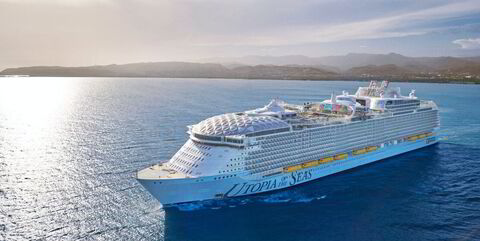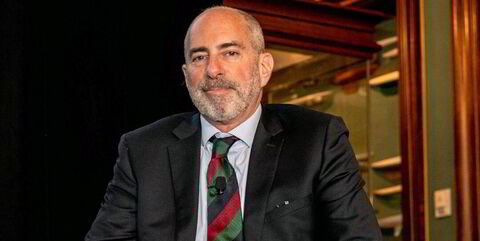Norway’s Klaveness Combination Carriers (KCC) is exploring the potential of improved vessel internet connectivity with a pilot of Elon Musk’s Starlink system.
A deal has been signed for the cutting-edge low-earth orbit satellite service with network provider Marlink.
“The move focuses on improving digital collaboration and data exchange between shore and ship, a key step in reaching KCC’s ambitious targets set for crew safety/welfare and carbon emission reductions,” KCC said.
While shipping has made significant headway in ship technology and navigation, vessels still experience persistent challenges in connectivity, which hinders efficient collaboration with offices onshore, the Oslo-listed owner explained.
Starlink provides high-speed, low-latency and high-capacity internet access even in the most remote maritime locations, the company believes.
“Starlink holds the potential for our vessels to make a quantum leap beyond traditional satellite internet services,” KCC chief executive Engebret Dahm said.
“This will allow us to bring the vessel closer to home, contributing to enhancing crew safety and welfare, as well as further improving the efficiency of our operations and cutting the carbon footprint of our business.”
KCC has installed Starlink on the 82,400-dwt Cleanbu vessel oil product and dry cargo ship Baru (built 2019). The 80,500-dwt Cabu caustic soda and bulk vessel Ballard (built 2017) is currently being outfitted.
In addition to greater collaboration with shore offices, the deal will allow KCC to build on its remote inspection initiatives first carried out in 2021, as well as enhancing real-time sensor data, analytics and digitalisation capabilities.
Seafarers will also be able to connect more securely with family and friends.
Last week, Bloomberg reported that the US Senate Armed Services Committee is looking into national-security issues raised by Musk’s decision not to extend the Starlink satellite network to aid a Ukrainian attack on Russian warships near the Crimean coast.
Chairman Jack Reed said the reports on the use of Starlink exposed “serious national-security liability issues and the committee is engaged on this issue”.




